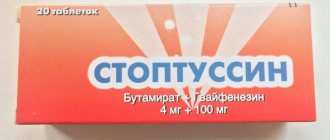Compound
| Pills | 1 table |
| active substances: | |
| butamirate citrate | 4 mg |
| guaifenesin | 100 mg |
| excipients: colloidal silicon dioxide; mannitol; MCC; glyceryl tribehenate; magnesium stearate |
| Drops for oral administration | 1 ml |
| active substances: | |
| butamirate citrate | 4 mg |
| guaifenesin | 100 mg |
| excipients: ethanol 96% - 0.3 g; floral flavor (aroma of alpine flowers) - 0.002 g; purified water - 0.007 g; polysorbate 80 - 0.001 g; liquid licorice extract - 0.003 g; propylene glycol - up to 1 ml |
Stoptussin Phyto syrup 100ml
Compound
Active ingredients: liquid thyme extract 4.1666 g, liquid thyme extract 4.1666 g, liquid plantain extract 4.1666 g.
Excipients: purified honey, sodium benzoate, propylparaben, sucrose, purified water.
Pharmacokinetics
Data on the pharmacokinetics of the drug Stoptussin-Fito are not provided.
Indications for use
As part of complex therapy for acute and chronic inflammatory diseases of the respiratory tract, accompanied by cough with difficult to separate sputum:
- tracheitis;
- bronchitis;
- tracheobronchitis.
Contraindications
- Decompensation of cardiac activity;
- liver diseases;
- kidney diseases;
- congenital fructose intolerance;
- impaired absorption of glucose and galactose;
- lack of an enzyme that breaks down sucrose and isomaltose;
- pregnancy;
- lactation period (breastfeeding);
- children under 1 year of age;
- hypersensitivity to the components of the drug.
The drug should be used with caution (due to the presence of ethanol in the drug) in patients with alcoholism, epilepsy, diseases and brain injuries.
Directions for use and doses
The drug is prescribed orally, after meals (due to the possibility of decreased appetite).
Adults and children over 15 years old - 1 tablespoon 3-5 times a day.
Children aged 1 to 5 years - 1/2-1 teaspoon 2-3 times a day, from 5 to 10 years - 1-2 teaspoons 3 times a day, from 10 to 15 years - 2 -3 teaspoons 3 times/day.
The average course of treatment is 7 days. Increasing the duration of treatment and repeat courses is possible on the recommendation of a doctor.
Storage conditions
The drug should be stored out of the reach of children, protected from light at a temperature of 10° to 25°C.
Best before date
4 years. Do not use after the expiration date.
special instructions
The drug contains 3.4 vol.% ethanol; 1 teaspoon (5 ml) contains up to 0.14 g of ethanol; 1 tablespoon (15 ml) - up to 0.41 g of ethanol.
The drug contains 62% sucrose, so it should be used with caution in patients with diabetes mellitus and in people on a low-carbohydrate diet. 1 teaspoon of the drug contains up to 3.1 g of sucrose, 1 tablespoon - up to 9.3 g of sucrose.
Use in pediatrics
The drug should be prescribed with caution to children (due to the possible negative effects of ethanol).
Description
Herbal medicine with expectorant and anti-inflammatory effects.
Pharmacodynamics
Expectorant drug of plant origin. Has an expectorant, anti-inflammatory effect, helps reduce the viscosity of sputum.
Side effects
Possible: allergic reactions.
Use during pregnancy and breastfeeding
The drug is contraindicated for use during pregnancy and lactation (breastfeeding).
Interaction
Stoptussin-Fito should not be used simultaneously with drugs containing codeine and other antitussive drugs, because this makes it difficult to cough up thin mucus.
Overdose
To date, there have been no reports of cases of overdose when using the drug.
Impact on the ability to drive vehicles and operate machinery
While taking the drug Stoptussin-Fito, you should refrain from performing potentially hazardous activities that require special attention and quick reactions (driving a car and other vehicles, working with moving mechanisms, working as a dispatcher and operator, etc.).
Pharmacodynamics
A combined drug that has an antitussive and expectorant effect.
Butamirate has a peripheral local anesthetic effect on the sensitive nerve endings of the bronchial mucosa, which provides an antitussive effect.
Guaifenesin increases the secretion of bronchial glands and reduces the viscosity of mucus. An increase in secretion is caused both by a direct effect on the bronchial glands - stimulation of secretion from the bronchial glands and removal of acidic glycoproteins from acinar cells, and by a reflex pathway, when irritation of afferent parasympathetic fibers of the gastric mucosa occurs and depression of the respiratory center. Increased tone of N.vagus
stimulates the production of bronchial secretions. The mucus produced by the bronchial glands increases the activity of the ciliated epithelium, as a result of which the evacuation of mucus from the bronchi and its coughing are facilitated.
Stoptussin-Phyto syrup 100 ml fl t/st/pack card x1
Trade name of the drug Stoptussin-Fito
International nonproprietary or generic name:
Plantain lanceolate leaf extract + Common thyme herb extract + Creeping thyme herb extract
Dosage form Syrup
Composition (per 100 ml):
Active ingredients: common thyme herbal extract liquid alcohol (Thyini extractum fluidiim etlianolum) - 4.1624 g.
creeping thyme herb liquid alcohol extract (Serpylli extractum fluidum etlianolum) - 4.1630 g.
lanceolate leaf plantain liquid alcohol extract (Plantaginis extractum fluidum etlianolum) - 4.1666 g.
Excipients: honey - 22.5000 g, sodium benzoate - 0.1250 g, sucrose - 62.0000 g, glycerol 85% - 0.0078 g, water - up to 100.0000 ml.
Description
Thick brown liquid with a specific odor.
Pharmacotherapeutic group Expectorant of plant origin.
ATX code: R05X
Pharmacological properties The drug has an expectorant, anti-inflammatory effect, and helps reduce the viscosity of sputum.
Indications for use
As part of complex therapy for acute and chronic inflammatory diseases of the respiratory tract, accompanied by cough with difficult to separate sputum (tracheitis, bronchitis, tracheobronchitis).
Contraindications
Hypersensitivity to the components of the drug, in patients with known intolerance to chalk and bee products, chronic heart failure (in the decompensation stage), liver and kidney diseases, congenital fructose intolerance, glucose-galactose malabsorption, sucrase/isomaltase deficiency, pregnancy, breastfeeding, children's age up to 1 year.
Carefully
Alcoholism, epilepsy, traumatic brain injury, brain diseases, diabetes.
Use during pregnancy and breastfeeding
The use of the drug during pregnancy and breastfeeding is contraindicated.
Directions for use and doses
Orally, after meals (due to the possibility of decreased appetite).
Children from 1 year to 5 years - 1/2-1 teaspoon 2-3 times a day, from 5 to 10 years - 1-2 teaspoons 3 times a day, from 10 to 15 years - 2-3 teaspoons 3 times a day, children over 15 years old and adults - 1 tablespoon 3-5 times a day. The course of treatment is 7 days. Increasing the duration and conducting repeated courses of treatment is possible on the recommendation of a doctor.
Side effects
Allergic reactions: dyspnea, skin rash, urticaria, and swelling of the face, mouth or throat (Quincke's edema).
Digestive system disorders: cramps, nausea, vomiting.
In these cases, as well as in the event of the development of any adverse events not listed in the instructions, you must stop using the drug and consult a doctor.
Overdose
To date, there have been no reports of cases of overdose when using the drug.
Interaction with other drugs
The drug Stoptussin-Fito should not be used simultaneously with drugs containing codeine and other antitussive drugs, as this makes it difficult to cough up liquefied sputum.
special instructions
If the patient’s condition does not improve or if there are attacks of suffocation, purulent sputum, or an increase in body temperature, you should immediately consult a doctor.
The drug Stoptussin-Fito contains 62% sucrose, so it should be used with caution in patients with diabetes mellitus and people on a low-carbohydrate diet. 1 teaspoon of Stoptussin-Fito contains up to 3.1 g of sucrose (which corresponds to 0.28 XE). in 1 tablespoon - up to 9.3 g of sucrose (which corresponds to 0.85 XE).
The drug Stoptussin-Fito contains 3.4% (volume) ethanol: 1 teaspoon of syrup (5 ml) contains up to 0.14 g of absolute ethyl alcohol: 1 tablespoon of syrup (15 ml) - up to 0.41 g of absolute ethyl alcohol: in the maximum daily A dose of Stoptussin-Fito for adults (75 ml) contains up to 2.05 g of absolute ethyl alcohol.
Impact on the ability to drive vehicles and machinery
During the period of treatment with Stoptussin-Fito, you should refrain from performing potentially hazardous activities that require increased concentration and speed of psychomotor reactions (driving vehicles, working with moving mechanisms, working as a dispatcher, operator).
Release form
Syrup.
100 ml in dark glass bottles with a measuring cap.
Each bottle, along with instructions for use, is placed in a cardboard box.
Storage conditions
At a temperature not exceeding 25 ° C in a place protected from light. Keep out of the reach of children!
Best before date
4 years. Do not use after the expiration date stated on the package.
Conditions for dispensing from pharmacies Without a prescription.
Pharmacokinetics
When taken orally, butamirate citrate is quickly and completely absorbed. Plasma protein binding is 94%. It is metabolized to form two metabolites, which also have an antitussive effect. Metabolites are excreted mainly by the kidneys (90%) and only a small part through the intestines. T1/2 - 6 hours.
Guaifenesin, when taken orally, is rapidly absorbed from the gastrointestinal tract. Communication with plasma proteins is insignificant. Guaifenesin is rapidly metabolized to form inactive metabolites that are excreted by the kidneys. T1/2 - 1 hour.
Side effects
If the recommended dosage regimen is followed, patients usually tolerate the drug well. Nausea, vomiting, diarrhea, decreased appetite, stomach pain, dizziness, headache, drowsiness, hives and skin rash may occur. These effects occur in approximately 1% of patients and usually resolve without dose reduction.
The frequency of adverse reactions listed below was determined according to the following criteria: very often (at least 1/10); often (more than 1/100, less than 1/10); uncommon (more than 1/1000, less than 1/100); rare (more than 1/10000, less than 1/1000); very rare (less than 1/10000), including isolated reports.
From the side of the central nervous system:
often - headache.
From the organ of hearing and balance:
often - dizziness.
From the digestive organs:
often - anorexia, nausea, abdominal pain, vomiting, diarrhea; very rarely - bitter taste in the mouth, heartburn, feeling of heaviness in the epigastrium (tablets).
For the skin and subcutaneous fat:
very rarely - exanthema, urticaria (tablets, oral drops), itching, hot flashes (tablets).
Additionally for tablets
From the respiratory system:
very rarely - shortness of breath.
From the SSS side:
rarely - chest pain; very rarely - tachycardia, palpitations.
Other:
very rarely - pain around the eyes.
Additionally for oral drops
From the kidneys and urinary tract:
very rarely - urolithiasis.
Side effects
If you adhere to the recommended dosage, patients tolerate the drug well. side effects usually disappear after the dose is reduced.
Metabolic disorders: lack of appetite.
From the nervous system: headache, drowsiness.
From the respiratory system: difficulty breathing.
Hearing impairment and vestibular disorders: dizziness.
From the gastrointestinal tract: discomfort, nausea, stomach pain, vomiting, diarrhea. If you experience stomach discomfort or other unusual effects, you should stop using the drug and consult your doctor.
From the skin and subcutaneous tissue: allergic reactions, including anaphylactic shock, angioedema, rash, itching, urticaria, exanthema.
From the urinary system: urolithiasis.
Directions for use and doses
Inside
, after meal.
Pills
The tablets are taken whole, without chewing, with liquid (water, tea, fruit juice).
For adults and children over 12 years of age, the drug is dosed depending on the patient’s body weight: less than 50 kg - 1/2 tablet. 4 times a day; 50–70 kg - 1 tablet. 3 times a day; 70–90 kg - 1.5 tablets each. 3 times a day; more than 90 kg - 1.5 tablets. 4 times a day.
The interval between doses should be 4–6 hours.
Drops for oral administration
The appropriate number of drops is dissolved in 100 ml of liquid (water, tea, fruit juice).
Dosage depending on the patient’s body weight: less than 7 kg - 8 drops 3-4 times a day; 7–12 kg – 9 drops 3–4 times a day; 12–20 kg - 14 drops 3 times a day; 20–30 kg – 14 drops 3–4 times a day; 30–40 kg – 16 drops 3–4 times a day; 40–50 kg - 25 drops 3 times a day; 50–70 kg - 30 drops 3 times a day; - more than 70 kg, 40 drops 3 times a day.
The interval between doses should be 6–8 hours.
Drinking plenty of fluids during the course of treatment enhances its effectiveness. When used in children weighing less than 7 kg, a dose reduction may be possible due to the fact that the child does not drink all 100 ml of the prepared mixture; however, the total concentration of the drug should not be exceeded.
If there is no positive effect, you should consult a doctor.
For precise dosing of the drug, you can use a dosing syringe (if supplied) (Fig. 1).
The scale on the syringe shows the number of drops in the measured dose.
Instructions for using the dosing syringe
1. Unscrew the cap of the bottle (counterclockwise).
2. Place the syringe in the adapter on the neck of the bottle in a vertical position (Fig. 2).
3. The bottle with the syringe placed in it should be turned upside down. It is necessary to hold the syringe tightly and, by pulling out the piston, draw the required amount of the drug (Fig. 3).
4. If necessary, measure a dose of 40 drops, take 10 and 30 drops alternately.
5. Turn the bottle upside down into a vertical position.
6. Carefully remove the syringe with the drug from the bottle adapter.
7. Dissolve the collected dose of the drug in water, tea or fruit juice.
8. Screw on the bottle with the drug (clockwise).
9. After use, rinse the syringe with warm water.
Note!
Description of the drug Stoptussin Phyto-Teva syrup fl. 100ml on this page is a simplified author’s version of the apteka911 website, created on the basis of the instructions for use.
Before purchasing or using the drug, you should consult your doctor and read the manufacturer's original instructions (attached to each package of the drug). Information about the drug is provided for informational purposes only and should not be used as a guide to self-medication. Only a doctor can decide to prescribe the drug, as well as determine the dose and methods of its use.
special instructions
If symptoms persist, a change in treatment should be considered.
The drug should not be prescribed for productive cough in patients suffering from long-term or chronic cough (including those caused by smoking), bronchitis or emphysema.
Impact on the ability to drive a car or perform work that requires increased speed of physical and mental reactions.
The drug Stoptussin® may have an adverse effect on the ability to drive vehicles and engage in other potentially hazardous activities that require increased concentration and speed of psychomotor reactions, due to the fact that it can cause dizziness and other side effects.
Features of application
Use during pregnancy or breastfeeding
Thyme preparations are contraindicated during pregnancy or breastfeeding.
The ability to influence the reaction rate when driving a vehicle or working with other mechanisms
Stoptusin Phyto does not affect or has a slight effect on activities that require increased attention and rapid motor and mental reactions.
Children
The drug is used for children over 1 year of age in accordance with the indications (dosages and route of administration are given in the “Method of administration” section).
Manufacturer
Pills
Teva Czech Enterprises s.r.o., Czech Republic, Ostravska 29, 747 70, Opava-Komarov.
Holder of the registration certificate: Teva Czech Enterprises s.r.o., Czech Republic.
Address for receiving claims: 119049, Moscow, st. Shabolovka, 10, building 2 (Business).
Tel/fax/35/36.
Drops for oral administration
Teva Czech Enterprises s.r.o., Czech Republic, Ostravska 29/305, 747 70, Opava-Komarov.
Registration Certificate Holder: Teva Pharmaceutical Enterprises Ltd., Israel.
Address for receiving claims: 119049, Moscow, st. Shabolovka, 10, building 2.
Tel.; fax/36.



